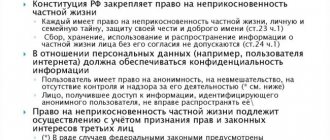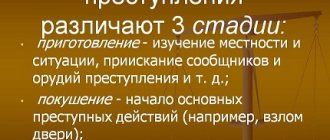Legally significant moment of beginning and end of life
When deciding whether there is an encroachment on a person’s life, the correct determination of the moment of its beginning and end . When does life ? There are several approaches to this problem. So, Shargorodsky M.D. believes that the moment the baby begins an independent life is either the beginning of breathing or the moment the umbilical cord separates. Borodin S.V. shares the same opinion, believing that the moment of the beginning of life should be considered the moment from which the child’s body is able to function independently and is completely separated from the mother’s body. However, if we recognize it as correct, causing the death of an already born child, who is still connected to the mother’s body by the umbilical cord, or a child during childbirth, whose head has already appeared from the mother’s womb, would not be considered murder in the criminal legal sense. Such a conclusion contradicts the current Criminal Code, which establishes liability for the taking of a child’s life by a mother immediately after childbirth or during it (Article 106 of the Criminal Code of the Russian Federation), called murder. The opposite position is enshrined in the criminal legislation of a number of foreign countries, for example, Germany and Switzerland, where the beginning of life is considered to be the moment of conception. This, however, does not mean equal criminal legal protection for the life of an intrauterine fetus and the life of an already born person. We believe that the point of view of Zagorodnikov N.I. is justified, who points out that the beginning of human life should be recognized as the beginning of physiological labor , since this moment indicates that the fetus is sufficiently mature and has acquired all the necessary qualities for extrauterine life. The appearance of a person is possible outside the process of physiological childbirth. Antonov V.F. gives the following example. A woman in the last months of pregnancy dies during surgery. However, doctors manage to separate the fetus from the mother's womb and support its further development with the help of medications. Interruption of life support in this situation may well be regarded as murder. No less controversial is the question of the moment of death. There is a distinction between clinical and biological death. Clinical begins from the moment of cardiac arrest. Biological is characterized by the occurrence of an irreversible process of decay of cells in the cerebral cortex, when the functions of all its parts disappear. In the legal literature, the opinion has been established that such a moment is biological death, which is confirmed by the Law of the Russian Federation “On Transplantation of Human Organs and (or) Tissues” dated December 22, 1992, Order of the Ministry of Health of the Russian Federation dated March 4, 2003 N 73 “On approval of the Instructions to determine the criteria and procedure for determining the moment of a person’s death and cessation of resuscitation measures,” a conclusion about death is given on the basis of a statement of irreversible death of the entire brain. If the brain continues to function, albeit in the absence of breathing and cardiac arrest, increasing oxygen starvation of other organs and tissues (clinical death), the person is considered alive and remains under the protection of criminal law. An attack on a deceased person (corpse) should be classified according to the intent of the perpetrator as attempted murder.
Seek professional legal advice from a professional lawyer!
Similar articles:
Articles → Concept and signs of criminal insult
News → The Investigative Committee of the Russian Federation is conducting an investigation into the death in a pre-trial detention center
—Root section— → End of crime
Articles → Illegal placement in a psychiatric hospital
Articles → Robbery - signs and concept. Signs of a crime.
The right to live
print version
Article 20 of the Constitution of the Russian Federation proclaims:
"1. Everyone has the right to life.
2. Until its abolition, the death penalty may be established by federal law as an exceptional measure of punishment for especially serious crimes against life, providing the accused with the right to have his case examined by a court with the participation of a jury.”
Human life in any civilized society represents the highest value and the primary right of the individual. The reality of ensuring the right to life is one of the significant indicators of the degree of democracy of the state. If life is the object of threats, then the meaning of all individual rights is lost. It is the absolute nature of life as a value that determines the highest importance of the right to life in the system of all rights.
The proclamation of this right in Article 20 of the Constitution of the Russian Federation requires the state to provide appropriate protection and protection, i.e. consolidation and implementation of specific forms and methods of activity of state, international and public organizations aimed at preventing threats to human life and creating conditions for their normal existence.
In addition to the Constitution, the right to life is enshrined in international documents. Article 3 of the 1948 Universal Declaration of Human Rights proclaims the right of every person to life, liberty and security of person. The International Covenant on Civil and Political Rights of 1966 declares: “The right to life is the inalienable right of every person. This right is protected by law. No one can be arbitrarily deprived of life.”
Everyone has the right to life - from birth to death. Establishing the temporal and biological boundaries of life is a complex problem that scientists and practitioners from a variety of specialties have been working on for many years.
Many points of view arise with the definition of the beginning of life: at what stage of its development the fetus becomes viable, i.e. is able to perform basic life functions independently? Based on the textual content of Art. 17 of the Constitution of the Russian Federation, which provides that “fundamental human rights and freedoms are inalienable and belong to everyone from birth,” then we must agree that a person has rights (and therefore the right to life) from the moment of birth. If we take another moment as a basis, then the question will arise: which moment to take as a basis - the moment of conception, the moment of the formation of the body, the moment the brain begins to work or the heart begins to work? International legal and interregional acts do not cover the issue of temporary criteria for the emergence of the right of a particular subject to life. The only exception is the American Convention on Human Rights, which proclaims the right to respect for human life from the moment of conception. If you rely on the data of modern medicine, when determining the beginning of life, you must be guided by physiological criteria. The fact of birth is associated with the separation of the fetus from the mother's body. However, a child may be initially stillborn, which is why doctors use the term “live birth,” i.e. the presence of unconditioned innate reflexes.
Proclamation of the right to life in the Constitution of the Russian Federation is not enough to ensure it, i.e. It is necessary to create conditions under which the right is not violated and is freely exercised by everyone. The right to life is ensured by a set of legal means enshrined both in the Constitution and in sectoral legislation.
Firstly, these are constitutional guarantees aimed at the free development of a person, the right not to be subjected to torture, other cruel treatment or punishment, as well as medical, scientific or other experiments, etc.
Secondly, these are legal norms that define the boundaries of the use of drugs, tools, mechanisms, and physical force that are dangerous to the life and health of people. We are talking, in particular, about such federal laws and other regulatory legal acts as the Criminal Code of the Russian Federation, the Criminal Procedure Code of the Russian Federation, Federal Laws “On Weapons”, “On Operational Investigative Activities”, “On the Federal Security Service”, etc. .
Thirdly, these are penalties established for actions that cause harm to human life and health or create a danger of causing such harm. The largest number of these measures are enshrined in the Special Part of the Criminal Code of the Russian Federation, the provisions of which provide for liability for murder, causing life-threatening bodily harm, exposure to danger and leaving in danger. Crimes against the peace and security of mankind related to the production or distribution of prohibited weapons of mass destruction, the use of prohibited means and methods of warfare, and genocide are considered especially serious crimes.
The death penalty is the most severe punishment, consisting in depriving a person of life. It is applied only by court verdict on behalf of the state and is assigned for a very narrow range of especially serious intentional crimes. The Criminal Code of the Russian Federation classifies such crimes as murder under aggravating circumstances, an attack on the life of a state or public figure, a person administering justice or a preliminary investigation), an attack on the life of a law enforcement officer, and genocide. Allowing for the possibility of depriving a person of life only in connection with the execution of the death penalty, the Constitution establishes that this measure, firstly, is exceptional, and secondly, is applied temporarily - “until its abolition.” This means that Russian society and the state intend to abandon this type of punishment in the future. Currently, there is a moratorium on the imposition of death sentences until the introduction of jury trials in each constituent entity of the Russian Federation, as well as a moratorium on the execution of the death penalty (in force since 1996), in connection with Russia's accession to the Council of Europe.
The Constitution of the Russian Federation guarantees the human right to life. According to generally accepted opinion, guarantees are divided into general and special (the latter are also called guarantees of justice). General guarantees include, for example, the possibility of appealing against unlawful actions and acts, the right to international protection, to compensation for harm caused, and the prohibition on issuing laws that abolish or diminish the constitutional right to life. Special guarantees are the right to judicial protection, legal assistance, presumption of innocence, etc.
The institutions that directly ensure the implementation of legal norms and guarantees in the field of ensuring and protecting the constitutional right to life include: the judicial mechanism, including the functions, system and activities of the courts;
mechanism of prosecutorial supervision; mechanism of the Commissioner for Human Rights; a mechanism for the protection of human and civil rights, inherent in the nature and competence of state authorities, public administration, constitutional supervision (in some constituent entities of the Russian Federation) and local self-government. Date of publication: 03/21/2013 Date of modification: 14/12/2016
Life as an object of criminal legal protection
In the science of criminal law, there is no single approach to defining the object of a crime against life, which includes murder. Some authors believe that the direct object of murder is social relations to protect human life. The right to life is considered by them as an objective right of every person, which is opposed by the duty of all other persons to refrain from encroaching on the life of another person [1].
A. N. Krasikov expressed the point of view according to which, in the case of murder, there is an encroachment, first of all, on the rights of the person, and not on social relations. He considers the right to life to be the direct object of assault during murder [2].
N.I. Zagorodnikov adheres to the opposite point of view, recognizing the corresponding social relations for the protection of life as the object of murder. He writes: “When we say life, health, we do not mean the physical meaning of “life”..., but understand by these terms the totality of social relations related to the protection of the individual” [3].
A number of authors consider human life as an object of encroachment along with social relations. Thus, according to Yu. A. Demidov, “the value of life or health is immeasurably higher than the totality of social relations being violated... Considering the value relationship, on the one hand, of social relations that may be damaged by these crimes, and on the other, life and human health, the law pointed to the latter as objects protected by the rules on liability for murder and for bodily injury. Another theoretical solution to this issue—recognizing only social relations as a protected object—contradicts the ethical provisions on the value of a person and the direct instructions of the criminal law” [4].
The latter point of view seems more convincing to us, since human life is not only a subjective right protected by legal norms, but also an independent social, spiritual and biological value. Since murder deprives a person of this value (life), the question inevitably arises of when its protection begins and when it stops. Understanding these time frames is directly related to the beginning and end of life. It is within these limits that liability for murder and other attacks on life may occur.
Of significant practical importance for the criminal legal assessment of an act as a crime against life is the determination of the boundaries of life, that is, the moment of its beginning and end. On the issue of the beginning and end of life, many different points of view can be found in the legal and medical literature. Thus, A. A. Piontkovsky believed that the moment of the beginning of an infant’s independent life is either the beginning of breathing or the moment of separation of the umbilical cord [5].
S.V. Borodin shares the same opinion, believing that the moment of the beginning of life should be considered the moment from which the child’s body is able to function independently and is completely separated from the mother’s body [6]. If we accept it as correct, then causing the death of an already born child, who is still connected to the mother’s body by the umbilical cord, or a child during childbirth, whose head has already appeared from the mother’s womb, would not be considered murder in the criminal legal sense.
However, such a conclusion contradicts the current Art. 106 of the Criminal Code of the Russian Federation, which establishes liability for the taking of a child’s life by a mother immediately after childbirth or during it, called murder.
A. A. Zhizhilenko took a more definite position. He believed that until labor began, there would be killing of the fetus, and not murder, but as soon as labor began, especially if part of the baby came out, we can talk about the birth of a person, whose murder should be punishable [7]. According to biologists, the life of a person as a biological individual begins with the fusion of the nuclei of male and female germ cells and the formation of a single nucleus containing unique genetic material.
From this point of view, abortion at any stage of pregnancy will have to be recognized as the intentional termination of a person’s life as a biological individual. This point of view has a right to exist, but it should not lead to the same criminal legal protection of human life and fetal life. In our opinion, the position of N.I. Zagorodnikov is more justified, who believes that the beginning of a person’s life should be recognized as the beginning of physiological contractions, since this moment indicates that the fetus is sufficiently mature and has all the necessary qualities for life.
The normative definition of the moment of the beginning of life is contained in Part 1 of Art. 53 of the Federal Law of November 21, 2011 No. 323-FZ “On the fundamentals of protecting the health of citizens in the Russian Federation” [8] and is determined by the moment of separation of the fetus from the mother’s body through childbirth. The medical criteria for live birth are defined in the Order of the Ministry of Health and Social Development of Russia dated December 27, 2011 No. 1687n “On the medical criteria for birth, the form of the birth document and the procedure for its issuance” [9].
Medical criteria for birth are: 1) gestational age of 22 weeks or more; 2) the child’s body weight at birth is 500 grams or more (or less than 500 grams in case of multiple births); 3) the child’s body length at birth is 25 cm or more (if the child’s body weight at birth is unknown); 4) gestational age is less than 22 weeks or the child’s body weight at birth is less than 500 grams, or if the birth weight is unknown, the child’s body length is less than 25 cm, - with a life expectancy of more than 168 hours after birth (7 days).
Signs of a live birth include breathing, heartbeat, pulsation of the umbilical cord or voluntary muscle movements, regardless of whether the umbilical cord is cut or whether the placenta has separated.
Thus, the beginning of life, and therefore the beginning of its criminal legal protection, is the time of separation of the newborn from the mother’s body, indicating that the fetus is mature enough for independent life. This position is most consistent with the current criminal law.
The moment of the end of life, i.e. the moment of death, is normatively defined in Art. 9 of the Law of the Russian Federation of December 22, 1992 No. 4180–1 “On transplantation of human organs and (or) tissues” [10] and is associated with the irreversible death of the entire brain (brain death).
The conducted study of the problems of criminal legal protection of life allows us to draw a number of conclusions that, in our opinion, have a definite theoretical and practical significance.
- Human life as an object of criminal legal protection cannot be recognized as a set of social relations that ensure the protection of human biological existence. Human life is one of the fundamental values that is given to a person and the system of state legal means is aimed at protecting it.
- Legal protection of life as a biological value is ensured within the limits of its actual existence. These limits are limited by the birth of a person and his death.
- Despite the diversity of opinions among lawyers, doctors, and biologists, the beginning of life should be recognized as the beginning of childbirth, and its end as biological death. It is within these time boundaries that an attack on the life of a specific person can be carried out, which is recognized as murder.
Literature:
- Krieger G. A. On the issue of distinguishing between murder in a state of passion and murder committed when the limits of necessary defense were exceeded / G. A. Krieger // Bulletin of Moscow University. - 1961. - No. 1. - P. 35–39.
- Krasikov A. N. Criminal law protection of human rights and freedoms in Russia / A. A. Krasikov. - Saratov, 1996. - P. 2. 174 p.
- Zagorodnikov N.I. The concept of the object of a crime in Soviet criminal law / N.I. Zagorodnikov // Proceedings of the Military Law Academy. - 1951. - No. 13. - P. 42–45.
- Demidov Yu. A. Man is an object of criminal legal protection / Yu. A. Demidov // State and law. - 2002. - No. 2. - P. 9–12.
- Piontkovsky A. A. Object of the crime. Soviet criminal law. General part / A. A. Piontkovsky. - M., 1959. - 174 p.
- Borodin S.V. Crimes against life / S.V. Borodin. - M., 1999. - 290 p.
- Zhizhilenko A. A. Crime and its factors // Russian criminological view. - M., 2008, No. 4. - P. 36–63.
- On the fundamentals of protecting the health of citizens in the Russian Federation: federal law of November 21, 2011 No. N 323-FZ: according to comp. as of July 29, 2021 // Collection of legislation of the Russian Federation. - 2011. - No. 48. - Art. 6724.
- On the medical criteria for birth, the form of the birth document and the procedure for its issuance: order of the Ministry of Health and Social Development of the Russian Federation dated December 27, 2011 No. 1687n: according to comp. as of September 2, 2013 // Russian newspaper. — 2012. — March 23. - No. 64.
- On transplantation of human organs and (or) tissues: Law of the Russian Federation of December 22, 1992 No. 4180-I: according to comp. as of May 23, 2021 // Gazette of the Congress of People's Deputies of the Russian Federation and the Supreme Council of the Russian Federation. - 1993. - No. 2. - Art. 62.
From what point does the criminal law protect human life: the paradox of regulation
Rostokinsky Alexander Vladimirovich,
Candidate of Legal Sciences, Associate Professor of the Department of Criminal Law Disciplines, Faculty of Law, State Educational Institution of Higher Professional Education, Moscow City Pedagogical University,
Privalov Alexander Vasilievich,
lawyer of the Moscow Bar Association "Last Watch".
Constitution of the Russian Federation in Art. 2 proclaims the highest value of man, his rights and freedoms. In Part 1 of Art. 20 The Basic Law proclaims everyone’s right to life. Recognition, observance and protection of this right is the responsibility of the state. The latter must protect a complex of personal, inalienable rights and freedoms, as well as civil rights and freedoms not only from illegal restrictions by subjects of power, but also by all other persons. An important mechanism for their protection within the country is criminal law protection. In order for such protection to achieve its goal, it is necessary to clearly define legislatively both the moment of the end and the moment of the beginning of human life.
From a biological point of view, a human being has two periods of life: uterine and extrauterine. Between them is childbirth, which is a rather long process, which can last from 10-12 to 20 hours. The initial stage of the second period is considered to be the beginning of metabolic processes (pulmonary breathing, accompanied by the first inhalation and cry) with the complete separation (extraction) of the newborn from the mother’s body. The protection of emerging life is a deeply moral requirement, but also a prerequisite for the formation of each individual, the acquisition of human qualities and all those human and civil rights that are guaranteed and protected by the international community and the state.
However, the Russian legislator does not directly name the moment from which a person’s life begins. While the final limit of human life is fixed in Part 2 of Article 9 of the Law of the Russian Federation of December 22, 1992 “On Transplantation of Human Organs and (or) Tissues” quite clearly: biological death (brain death)[1]. “Based on this,” writes R. Sharapov, “a person’s legal life is the life of his brain, and the beginning of the life of the brain means the beginning of a person’s life. Consequently, from a legal point of view, the initial boundary of human life today, at a minimum, should be associated with the appearance of a formed mass of brain cells (the birth of the brain), making the fetus viable”[2]. And this happens in the mother’s womb long before the birth of the child itself (by the fifth month of pregnancy)[3].
The validity of this approach was indirectly recognized by our legislator in Article 36 of the Fundamentals of the Legislation of the Russian Federation on the protection of the health of citizens dated July 22, 1993. In accordance with it, artificial termination of pregnancy for a period of more than 22 weeks (approximately 5 months of intrauterine development of the fetus) is carried out only if there are medical indications and the woman’s consent[4]. The medical literature describes cases where children born at this stage survived[5].
It should be noted that the Christian Church (without distinction of religion) recognizes abortion, regardless of the reasons for its implementation, as a grave sin. The approaches to this issue of representatives of other major world religions are no different. In the Russian Empire, this operation was recognized in the canonical tradition as infanticide and entailed criminal prosecution both for the specialists who expelled the fetus and for the women themselves who had an abortion. However, the Soviet government in regulating abortion was far ahead of all modern adherents of secular humanism or the primitive “right of life and death.” Thus, by a joint resolution of the People's Commissariat of Health of the RSFSR and the People's Commissariat of Justice of the RSFSR "On artificial termination of pregnancy" dated November 18, 1920, abortion was legalized without significant restrictions. Then, however, they realized it, and by the Decree of the Central Executive Committee and the Council of People's Commissars of the USSR “On the Prohibition of Abortions” dated June 27, 1936, abortion was prohibited and criminal liability was introduced. They existed until the adoption of the Decree of the Presidium of the Supreme Soviet of the USSR “On the abolition of the ban on abortion” on November 23, 1955[6]. During this period, 28 and even 30 weeks were recognized as acceptable periods for abortion.
It should be recognized that this remedy remains one of the most “effective” in conditions of low educational and cultural levels, massive breakdown of families, and the lack of modern knowledge and means of contraception. According to official data from the State Statistics Committee of the Russian Federation, in our country at the beginning of the 21st century, about 2 million abortions are performed annually, while in 1992 their number was close to 3.5 million, and in 1997 it was approximately 2.5 million. At the same time, only 3% of them are done for medical reasons in late pregnancy[7]. The number of abortions performed in illegal and semi-legal clinics is extremely large, and even in Moscow, according to various estimates, amounts to up to 40% of all pregnancy terminations[8].
Currently, by the Decree of the Government of the Russian Federation of August 11, 2003, the number of so-called social indications for artificial termination of pregnancy at a period of 12 to 22 weeks has been reduced from 13 grounds to 5 [9]. But, again, a person who deliberately violates these restrictions is recognized not as a murderer, but as a person who illegally performs an abortion, and even then, only if this person does not have a special medical education. The law says nothing at all about the responsibility of the woman herself who deliberately terminates a pregnancy at such a stage.
A largely paradoxical situation arises: the moment of emergence of the right to an intangible benefit (the right to life), enshrined in federal legislation, is significantly distant in time from the moment of the appearance of this benefit (the origin of life). So, according to Part 2 of Art. 17 and part 1 of Art. 20 of the Constitution of the Russian Federation, the right to life belongs to everyone from birth, and in accordance with Part 2 of Art. 17 of the Civil Code of the Russian Federation, the legal capacity of a citizen arises at the moment of his birth. But the biological birth of a child is a rather lengthy process. As a result of such uncertainty, legislation and law enforcement practice associate a legal fact with the medical criteria for a human live birth, which, as is known, are established after the full birth of a child (his birth as a whole)[10].
The approach of the domestic legislator to resolving the issue of criminal law protection of the life of a newborn person raises even more questions. First of all, it is worth noting such a privileged crime as the murder of a newborn child by a mother (Article 106 of the Criminal Code of the Russian Federation). Not only is this crime not recognized as serious at all, which in itself prevents the implementation of a full range of operational investigative measures for unsolved crimes, but it also opens up a broad road to exemption from criminal liability and punishment for women who simply cannot be called mothers, their amnesties, paroles, etc.
It is more difficult to qualify actions that are expressed in active influence on the fetus in late pregnancy before the onset of labor, with the aim of killing the fetus and (or) causing premature birth. In this case, any intervention that does not have a medical basis is unacceptable, i.e. not intended to save a woman’s life or, at a minimum, to eliminate a real danger to her life. Any other interference is illegal within the meaning of Article 36 of the Fundamentals of the Legislation of the Russian Federation on the protection of the health of citizens, but is not prosecuted under criminal law.
In addition, in the current version of Art. 106 of the Criminal Code of the Russian Federation, the moment of newbornness is enshrined in general in contradiction with the dominant position in the theory of criminal law. According to the disposition of the said article, a person’s life begins to be protected, although not during childbirth, but from the moment the child is newborn, which in a medical sense means the complete expulsion (extraction) of a fetus with signs of a live birth (pulmonary breathing, heartbeat, cry, voluntary muscle contractions, etc.). In the doctrine of domestic criminal law, the beginning of criminal legal protection of human life is associated with the moment of the appearance outside the mother’s womb of any part of the body of the expelled (removed) child. Accordingly, the killing of a fetus in the womb before it is born (even if there is a real possibility of saving the life of this child in case of premature birth) is not regarded as a crime against life, but is considered an termination of pregnancy, which can be qualified as a crime against health.
Consequently, a literal interpretation of Article 106 of the Criminal Code of the Russian Federation means that the life of the fetus during the period of its expulsion from the mother’s body until its full birth, not to mention its uterine life, generally falls out of the scope of criminal legal protection of human life[11]. This is how the investigative bodies determine the signs of a crime: on the basis of a forensic medical examination of the discovered corpse of a newborn and the establishment of signs of the onset of spontaneous breathing. Intentional killing of a child during birth by direct impact on his body, from the point of view of current legislation, cannot be recognized as murder, but is an termination of pregnancy. And such an approach, according to R. Sharapov, V. Pankratov and a number of other authors, cannot be considered fair[12]. According to A.N. Popov, which we fully agree with, “the legislator took only half a step in the criminal legal protection of life, ... without linking responsibility for this crime with the criminal legal protection of the life of a child in the womb”[13].
It seems that a solution to the problem of criminal law fixing the moment of the beginning of the protection of life should be sought taking into account foreign, primarily European, legislative experience. For example, the German legislator included seven (!) quite lengthy paragraphs in Section 16 “Criminal acts against life” of the German Criminal Code, including:
1) on liability for termination of pregnancy for periods of more than 12 weeks without a doctor’s conclusion, as well as for periods of pregnancy of more than 22 weeks in the absence of emergency indications (prg. 218 and 218-a);
2) on the responsibility of doctors and staff of special clinics for violating the procedure for conducting preliminary consultations, issuing conclusions and rules for abortion (prg. 218b-c, 219);
3) on responsibility for public campaigning for termination of pregnancy, including advertising of the relevant ones, as well as for the sale of means and items intended for termination of pregnancy (prg. 219a-b)[14]. There is no trace of anything like our Article 106 of the Criminal Code of the Russian Federation in German criminal legislation for a long time: everyone’s life must be protected equally. If the woman in labor is in an affective state, is not fully aware of her actions, etc., then it is necessary to apply the appropriate rules on the limited sanity of the killer, and not ahead of time orient the court towards leniency on formal grounds.
Under the influence of the legislative practice of leading European states, in many countries an abortion performed in the late stages of pregnancy from 12 to 22 weeks is beginning to be considered murder, regardless of the consent and role of the pregnant woman herself in this operation, unless there is a single emergency circumstance, the need to save the woman’s life . Thus, in 2004, the United States adopted the federal “Unborn Victims of Violence Protection Act,” which recognizes the fetus as a human being and has the same rights as a newborn[15].
In our country, judicial practice in cases of infanticide and illegal abortions is formed under the influence of mutually exclusive requirements imposed by society on law enforcement: unconditional protection of every human life and strict punishment for murder, on the one hand, and the requirement of leniency for the “stumbled” woman who “ You can’t ruin your life,” on the other hand. Recognition of the priority of the second requirement inevitably leads to a legalized barbaric downplaying of the value for society of the lives of some citizens (who have done nothing wrong) relative to the value of leniency for the criminal actions of a child-killing mother. By the way, she is in a clearly advantageous position in the criminal process: no one can appeal against a deliberately lenient sentence or the unjustified termination of a criminal case, except the father of the child. And he is usually unknown.
To achieve complete logic in resolving the issue under consideration, it is impossible to do without changing certain constitutional norms. In particular, the norm of Part 2 of Art. 17 of the Constitution of the Russian Federation can be stated as follows: “Fundamental human rights and freedoms are inalienable and belong to everyone from birth, unless otherwise provided by this Constitution.” And the imperative of Part 1 of Art. 20 of the Constitution of the Russian Federation should be supplemented with the following clause: “Everyone has the right to life after reaching 22 weeks of uterine development.” This requires a package of legislative changes that, of course, affect not only the Special Part of the Criminal Code of the Russian Federation. As part of improving the criminal law, it is advisable to:
1. Bring the norms of Article 106 of the Criminal Code of the Russian Federation into line with the priorities of the constitutional and legal protection of the right to life of every child, setting them out as follows: “The murder of a woman carrying a child during a period of more than twenty-two weeks of pregnancy, during or immediately after childbirth, and Likewise, the murder by a mother of a newborn child in a psychotraumatic situation or in a state of mental disorder that does not exclude sanity is punishable by imprisonment for a term of up to six years.”
2. Add to the list of crimes contained in Part 2 of Article 20 of the Criminal Code of the Russian Federation the crime of “murder by a mother of a newborn child” (Article 106) to avoid increasing the liability of adolescents who committed this crime under Article 105 of the Criminal Code.
3. Provide Article 105 of the Criminal Code with a note containing an explanation of the terms and evaluative concepts used in the criminal law, stipulating that “in the articles of this Code, a person is recognized as a child aged more than 22 weeks of pregnancy, a newborn child, or another individual before death.”
4. The corresponding changes will need to be made to the norms of clauses “a” and “g”, part 2 of article 105 of the Criminal Code of the Russian Federation, as well as part 1 of art. 111 of the Criminal Code of the Russian Federation:
a) the sign of paragraph “a” of Part 2 of Article 105 of the Criminal Code of the Russian Federation must also include the murder of a woman who, known to the perpetrator, is in a state of pregnancy at a period of 22 weeks or more.” Liability in each such case must occur taking into account clause “c” of the same part of the article, i.e. helplessness of the second victim;
b) the sign of paragraph “d” of Part 2 of Article 105 of the Criminal Code of the Russian Federation should sound like: the murder of “a woman who, known to the perpetrator, is in a state of pregnancy with a period of no more than 22 weeks”;
c) the corresponding sign of the severity of harm caused to health, provided for in Article 111 of the Criminal Code of the Russian Federation, should be formulated as “termination of pregnancy for a period of no more than 22 weeks.”
It seems that these recommendations will help achieve a social compromise between the idea of absolute inviolability and protection of human life and the moral and legal concept of freedom of motherhood, which includes, among other things, the policy of family planning.
Literature
1. Gazette of the Congress of People's Deputies of the Russian Federation and the Supreme Council of the Russian Federation. 1993. No. 2.
2. Gazette of the Congress of People's Deputies of the Russian Federation and the Supreme Council of the Russian Federation. 1993. No. 33.
3. Collection of legislation of the Russian Federation. 2000. No. 26.
4. Collection of legislation of the Russian Federation. 2003. No. 33.
5. Civil law. Part.1: Textbook / ed. A.P. Sergeeva, Yu.K. Tolstoy. M., 1998.
6. On the issue of the beginning of criminal law protection of human life // Criminal law. 1999. No. 4.
7. Brief medical encyclopedia: In 3 volumes. T.2. 2nd ed. M., 1989.
8. Krasnopolskaya I., Sokolova I. Murder by diagnosis // Russian newspaper. 2002. August 30.
9. Krylova N.E. Responsibility for illegal abortion and the need for criminal legal protection of “future” life // Bulletin of Moscow University. Episode 11. Law. 2002. No. 6.
10. Commentary on the Criminal Code of the Russian Federation. Ed. 2nd / Ed. Yu.I. Skuratov and V.M. Lebedeva. M., 1999.
11. Pankratov V. Problems of establishing criminal liability for illegal abortion // Criminal law. 2001. No. 3.
12. Popov A.N. Aggravated murders. M., 2003.
13. Russian statistical yearbook. M., 1999.
14. Romanovsky G.B. Epistemology of the right to life. St. Petersburg, 2003.
15. Tasakov S., Shumilov A. Artificial termination of pregnancy (abortion). Criminal legal aspects // Criminal law. 2004. No. 2.
16. Criminal Code of the Federal Republic of Germany (1871) according to hundreds. as of 08/17/1999 / Transl. with him. edited by A.V. Serebryannikova. M., 2000.
17. Sharapov R. The beginning of criminal law protection of human life: experience of legal analysis. // Criminal law. 2005. No. 1.
Received by the editor on August 19, 2009.






